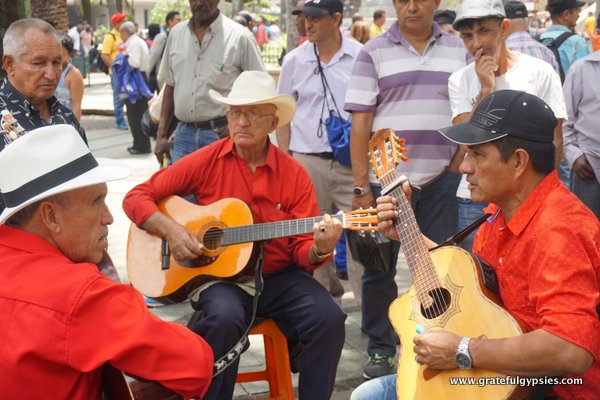Spanish Power Verbs – Ir Posted by sasha on Sep 30, 2020 in Spanish Vocabulary
When you’re a beginner with any language, a great place to start is by learning so-called “power verbs.” These are the most important verbs that you use on a daily basis. It’s been a while since my last post about Spanish power verbs. You can go back and check out those posts if you missed them (necesitar, querer, gustar, y poder). I spent a few weeks studying Spanish power verbs in Puerto Vallarta and it helped me gain the confidence I needed to order food, take a taxi, and do all the other basic essentials. Today we’ll take a look at another power verb – ir, meaning “go.”
Conjugation in Simple Present
The verb ir is one of the most commonly used verbs in Spanish, so it’s definitely a useful one to practice! The problem is that it’s also highly irregular. I’m keeping it simple today by focusing on the simple present tense.
I’ll focus on using the verb to mean “going to” as that’s the form for using ir as a power verb. By that, I mean you can combine it with the infinitive form of another verb to make a sentence (“I’m going to eat”, for example). Here’s the simple present conjugation for ir meaning “going to”:
Tú vas a
Usted va a
Él va a
Ella va a
Nosotros vamos a
Ustedes van a
Ellos/ellas van a
You are going to (familiar)
You are going to (formal)
He is going to
She is going to
We are going to
You are going to (plural)
They are going to
As you can see, you add a to the end of each one. This differentiates between “go” and “going to.” It will make more sense after you take a look at some examples. As usual, yo, tú, and nosotros are all implied, so you don’t really need to say the pronouns.
For those learning Spanish to visit Spain, you can also add vosotros váis a (you all are going to, informal). I’ve been in Latin America for a few years now and no one uses that here so I won’t be using that particular form.
Positive Statements
Like I said, this will make a lot more sense to you once you see some examples. Here are some positive statements using the verb ir to mean “going to:”
Vamos a visitar el museo este fin de semana.
We are going to visit the museum this weekend.
Voy a aprender español en México este año.
I’m going to learn Spanish in Mexico this year.
Él va a regresar a su casa despues de la fiesta.
He is going to go home after the party.
Vas a jugar fútbol con tus amigos mañana.
You’re going to play soccer with your friends tomorrow.
Ellos van a vivir en Colombia el próximo año.
They are going to live in Colombia next year.
Usted va a hacerlo esta noche.
You’re going to do it tonight.
Ella va a cocinar el desayuno hoy.
She is going to cook breakfast today.
Ustedes van a la escuela juntos.
You are going to school together.
Ellas van a ver una película en la tarde.
They are going to see a movie in the afternoon.
Now it’s your turn! See if you can come up with a few positive statements using the power verb ir.
Negative Statements
To make negative statements, you simply need to add no before the correct form of the power verb. Here are some examples to follow:
No vas a leer el periódico esta mañana.
You’re not going to read the newspaper this morning.
Ella no va a comprar esta computadora.
She’s not going to buy this computer.
No vamos a comer carne este mes.
We’re not going to eat meat this month.
Ellos no van a trabajar mucho hoy.
They’re not going to work much today.
No voy a ir al mercado mañana.
I’m not going to go to the market tomorrow.
Él no va a tomar café antes de la clase.
He is not going to have coffee before class.
Asking Questions
As has been the case with all the power verbs we’ve looked at on the blog, asking yes/no questions is muy facil – just add the question marks to positive statements and change your intonation. Here are a few examples:
¿Vamos a la playa este sábado?
Are we going to the beach this Saturday?
¿Usted va a limpiar la casa hoy?
Are you going to clean the house today?
¿Él va a hablar con su jefe este tarde?
Is he going to talk to his boss this afternoon?
¿Ellos van a escuchar música en la fiesta?
Are they going to listen to music at the party?
¿Vas a tocar la guitarra con tus amigos?
Are you going to play guitar with your friends?
As you can see, it’s pretty easy to ask yes/no questions. It’s also very easy to answer them – just say Sí or No. For the sake of practicing, though, why not answer with a complete sentence? Take that last question, for example. You could answer by saying “Sí, voy a tocar la guitarra con ellos” or “No, no voy a tocar la guitarra con ellos.”
Of course, we don’t always just ask yes/no questions. Here a few other examples of questions using ir as a power verb:
¿Cuándo vas a llegar a la oficina?
When are you going to arrive at the office?
¿Dónde vamos a comer esta noche?
Where are we going to eat tonight?
¿A qué hora van a jugar tenis mañana?
What time are they going to play tennis tomorrow?
Now can you see why ir can be called a power verb in Spanish? For your last exercise, see if you can make a few different questions using it yourself. Even better – get out there and use them with a Spanish speaker to practice!

Build vocabulary, practice pronunciation, and more with Transparent Language Online. Available anytime, anywhere, on any device.







